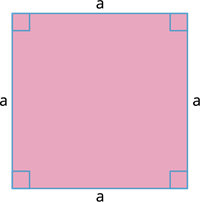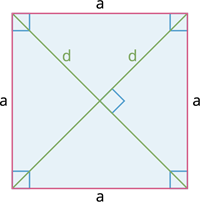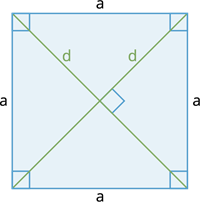
PUMPA - SMART LEARNING
எங்கள் ஆசிரியர்களுடன் 1-ஆன்-1 ஆலோசனை நேரத்தைப் பெறுங்கள். டாப்பர் ஆவதற்கு நாங்கள் பயிற்சி அளிப்போம்
Book Free DemoArea of a square: The area of the square is the product (multiply) of the length of its sides.

Area = side × side.
Area (A) = a × a = a² square units or A = a² or a² = A or a = √A.
Where 'a' denotes the side of the square.
Side of the square = P/4 units.
Given the diagonals(d), the area of a square = 1/2×(d²) = d²/2.
The perimeter of a square: The perimeter of a square is the sum of the length of its sides.

The perimeter(p) = AB + BC + CD + DA or p = (a + a + a + a) = 4a units.
Where 'a' denotes the length of each side of a square.
Diagonals of a square: Diagonals of a square are equal in length, they bisect the angles, and they are the perpendicular bisectors of each other.

Length of the diagonal(d) =\ √(a² + a²)\ = √(2a²)\ = a√2 units.
Where 'd' denotes a diagonal of a square is equal to side length times square root of 2.